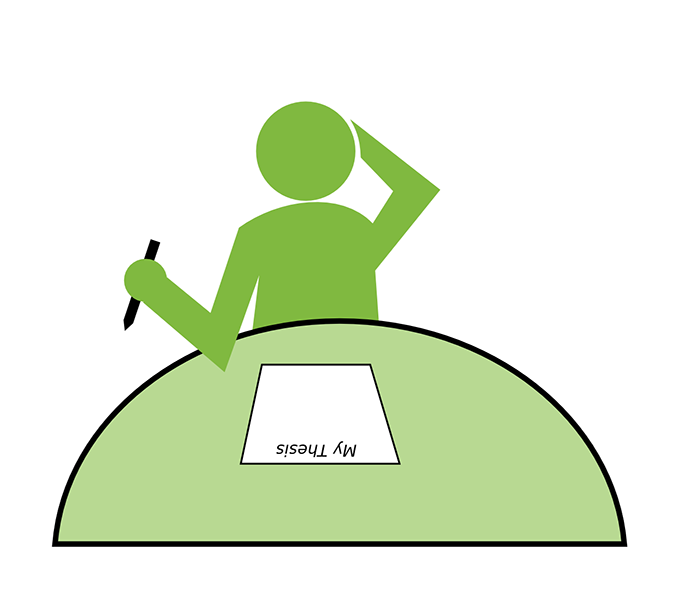
One of the most difficult things about the dissertation process is its solitary nature. When I reached that stage of my degree, I felt like people told me to go sit in a corner and write until I produced something perfect and brilliant. It took me a long time to understand that my dissertation was never going to be perfect; it took me an even longer time to understand that it wasn’t supposed to be. By the end of the process, I felt completely isolated by and with my dissertation and was at a loss as to what to do about it. What I know now is that at least some of that could have been rectified had I taken full advantage of campus resources, especially the campus writing center.
It is possible that I am overly biased in favor of writing centers because I now work full-time as a professional writing consultant in one, but I also know that the writing center is a great and often overlooked resource for those in the midst of the dissertation process. Some of this is the fault of writing centers; we often do not do as much as we could or should to reach out to graduate students. Much of it, however, seems to be rooted in outmoded notions of writing centers: many students, graduate or otherwise, do not make use of writing centers because they think that writing centers are places where “bad” or “broken” writing goes to “fixed,” or they think that writing centers are places where grammar scolds pontificate on the wonders of the semicolon and/or yell at students about commas with coordinating conjunctions. The dissertation process only exacerbates these concerns because they are overlaid by the certainty that no one in the writing center is going to have the content knowledge to be of any help to someone working through a dissertation.
Happily, much of this is not true. Writing centers can certainly help with grammar and punctuation if need be, but the goal of most writing centers is to engage writers about their ideas. One thing is true though: odds are that no one will be an expert on the content of your dissertation. But that does not matter in the least. Good writing centers count on writers to be experts in their subject areas; their goal is to help the writer think through those ideas as thoroughly as possible while offering assistance with structure, organization, and formatting. What’s more is that many, if not most, writing centers are staffed by graduate students and administrative faculty with advanced degrees. As a writing center administrator and consultant, I don’t have much content knowledge about most of the writing I work on with students—my PhD is in eighteenth-century British Gothic fiction—but I, along with almost every other consultant and administrator I know both at my university and other universities, have a wealth of knowledge about argument structure, good consulting practices, academic writing, and documenting sources.
The technical aspects of academic writing are important, but perhaps the most valuable service offered by writing centers is the non-evaluative nature of a writing consultation. What I mean by that is that writing centers are places where no one is going to sit in judgment of your research or your writing because writing centers understand that drafts are works in progress by their very nature. As a result, they are great places to go to get initial feedback on a chapter or a section of your dissertation. Also, most writing centers do not require you to have a draft already in order to have a consultation. Some of the best consultations I have are with writers that come in looking to make an outline or to discuss ideas before they start drafting. A good consultant can help you to see the strengths and weaknesses of your argument, and they can help you devise a strategy that will allow you, your ideas, and your research to shine.
Writing centers are also a chance to get a second pair of eyes on something before it goes to your committee chair. Sending written work to my chair was always daunting for me. To some extent, I think this comes with the dissertation territory, but I also think that my writing, my dissertation, and my mental health would have benefitted from regular writing center consultations. Many writing centers also allow students to request specific consultants to work with, so you often will have the opportunity to develop a relationship with a consultant and work with them over the course of your entire dissertation. I have a number of graduate students and faculty members that I work with over the course of entire projects; these relationships are part of what makes writing center work so worthwhile for me. Additionally, I regularly meet with one of our consultants to brainstorm ideas and to get a second opinion on my own writing.
In short, writing centers are an excellent but often overlooked campus resource that all graduate students, but especially those writing dissertations, should make use of regularly. Let me close on this note: chances are, you pay some sort of student fee that goes directly or indirectly to your university writing center; those folks are going to get paid whether you show up or not, so give them something to do. You will be glad you did.
Author Bio: Dr. G. David “Dave” Beasley completed his PhD in eighteenth-century British fiction at the University of Nevada, Las Vegas (UNLV) in 2017. His work focuses on the intersections between Gothic fiction, Enlightenment, and dissenting religious communities.
